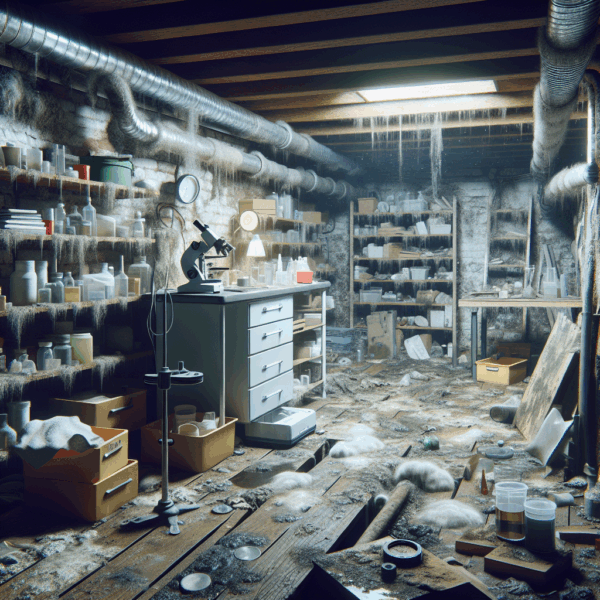
Introduction
Imagine walking through your home, feeling perfectly fine one moment, only to be engulfed by a foggy veil of fatigue and discomfort the next. This scenario is all too familiar for those who unknowingly harbor mold within their walls. Mold sickness can creep up on you like an uninvited guest, leaving you wondering what’s wrong. In this article, we will unravel the mystery of mold-related health issues, highlighting the signs and symptoms that may signal its presence in your life.
Table of Contents
- Understanding Mold and Its Impact
- Common Signs of Mold Sickness
- Health Effects and Symptoms
- Who is at Risk?
- What to Do if You Suspect Mold
- Prevention Strategies
- Conclusion
Understanding Mold and Its Impact
Mold is a type of fungus that thrives in damp environments. It can be found both indoors and outdoors, often appearing as fuzzy patches in varying colors. While it plays a vital role in nature by breaking down organic matter, its presence indoors can be detrimental to our health. Just like a thief in the night, mold sneaks into our homes, bringing along a host of potential health problems.
Common Signs of Mold Sickness
Recognizing the signs of mold sickness is paramount in safeguarding your health. Here are some common indicators:
- Respiratory Issues: Persistent cough, wheezing, or difficulty breathing could hint at mold exposure.
- Allergic Reactions: Sneezing, runny nose, itchy eyes – these symptoms can resemble seasonal allergies but may stem from mold.
- Skin Irritation: Rashes or skin irritations might emerge when mold spores come into contact with your skin.
- Fatigue and Headaches: Unexplained fatigue or frequent headaches can signal underlying mold exposure.
Health Effects and Symptoms
The impact of mold on health varies from person to person. Some may experience mild symptoms, while others face more severe health challenges. Here are some potential health effects:
- Asthma Attacks: For asthma sufferers, mold can exacerbate their condition, leading to increased attacks and respiratory distress.
- Mold-Induced Illness: Prolonged exposure can lead to chronic conditions such as sinus infections or hypersensitivity pneumonitis.
- Mental Health Decline: Recent studies suggest a link between mold exposure and mental health issues like anxiety and depression.
Who is at Risk?
While anyone can be affected by mold exposure, certain groups are more susceptible:
- Individuals with Allergies or Asthma: These individuals may react more severely to mold allergens.
- The Elderly: Older adults often have compromised immune systems.
- Children: Their developing lungs make them more vulnerable to respiratory issues.
- Pregnant Women: Hormonal changes can affect immune response, increasing susceptibility.
What to Do if You Suspect Mold
If you suspect that mold may be affecting your health, it’s crucial to take action. Start with a professional mold inspection. If mold is detected, engaging in effective remediation services is essential to eliminate the problem and restore a healthy living environment.
Prevention Strategies
Prevention is always better than cure. Here are some proactive steps you can take:
- Control Humidity Levels: Keep indoor humidity below 50% using dehumidifiers.
- Regular Inspections: Conduct routine checks for leaks and water damage.
- Purge Clutter: Reduce clutter where mold can thrive.
- Ensure Good Ventilation: Use exhaust fans in bathrooms and kitchens to minimize moisture buildup.
Key Takeaways
Mold sickness is not just an inconvenience; it can profoundly impact your health. Being vigilant about symptoms, understanding risk factors, and taking preventive measures are vital steps toward maintaining a healthy environment. Always consult professionals for inspections and remediation when necessary.
FAQ Section
1. How do I know if my symptoms are related to mold?
If you notice an increase in respiratory issues or allergic reactions coinciding with damp conditions in your home, it’s wise to consult a healthcare professional and consider a mold inspection.
2. Can mold exposure lead to long-term health issues?
Yes, prolonged exposure can result in chronic respiratory conditions and other serious health problems. Early detection and remediation are crucial.
3. What should I do if I find mold in my home?
If you discover mold, avoid touching it and seek professional assistance for safe removal. A comprehensive mold remediation service can help ensure complete eradication.
Conclusion
Mold sickness can stealthily weave its way into our lives, impacting our health without us realizing it. By staying informed about the signs and symptoms, understanding the risks, and implementing prevention strategies, you can protect your home and loved ones from this hidden menace. Remember, vigilance today ensures a healthier tomorrow. Don’t hesitate to reach out for professional help, because your health is worth it!
